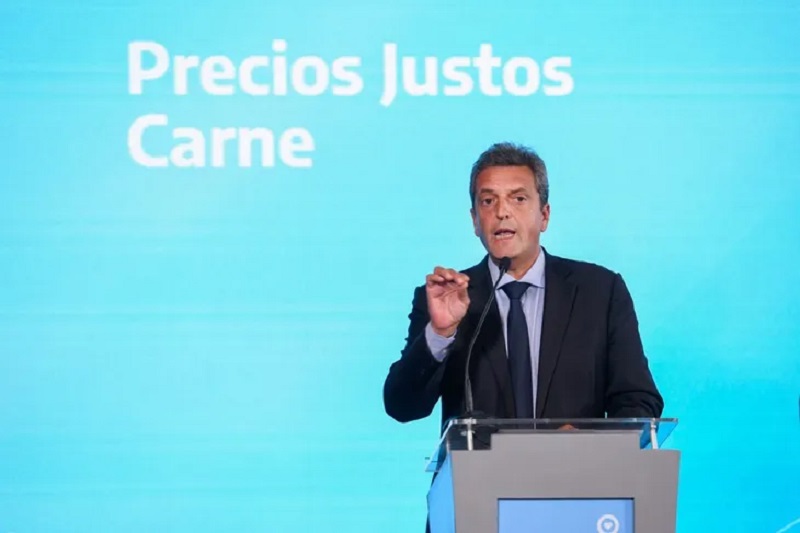
The day before knowing the result of the inflation corresponding to the month of January, which is expected to exceed 5%, Sergio Massa presented an agreement of prices for meat. Private estimates had been anticipating that meat reached a 20% climb in January.
The average announced by the Minister of Economy, the Secretary of Commerce and the Minister of Agriculture; It will come into effect from this Friday. Exactly one week ago, Massa and Tombolini presented the second stage of the program Fair Prices. The expanded version of this program includes a school basket and prizes for participating companies that will access credits with subsidiary rates, among others.
The Fair Meat Prices program follows the same trend, its purpose is to assist producers affected by the drought. It also establishes a 10% refund for consumers who pay for their purchases at butcher shops and mini markets with debit cards.
Sergio Massa argued that it is a comprehensive plan to promote the production and consumption of meat. Given the impact of the rise in the price of meat in the January measurements, from Economy they seek to encourage producers to adhere to the agreement in order to increase the meat supply.
The Secretary of Commerce, Matías Tombolini, stressed that the agreement reached with exporting refrigerators aims to provide certainty in terms of prices and in the provision of seven cuts with discounts of around 30%. And he added that they will seek to “guarantee” the supply of 15,000 tons of seven cuts of beef in the main marketing chains.
The cuts included in the program are: Roast at $1,035 per kilo, buttock at $1,375 per kilo, matambre at $1,310 per kilo, empty at $1,351 per kilo, brisket at $765 per kilo, shoulder at $1,113 per kilo, and roast cover at $1,035 per kilo . Their prices will remain fixed until March 31, then they will have increases of 3.2% until June 30.
Los refunds The 10% only apply to buy in butcher shops and small businesses, but not for supermarkets and hypermarkets. The reimbursement ceiling will be $2,000 per month.
Among the benefits and incentives for merchants that adhere to the program is the exemption by ARBA for one year of the Tax on Gross Income, the deferral of the payment of tax obligations controlled by AFIP. It also seeks to encourage the banking of small businesses, and lines of credit will be offered.
While livestock producers will have improvements in the current legislation on leather treatment that includes flexibility in export rights; and they will be able to access subsidies for up to 40% of the food necessary for the completion of the animals in feedlot. With the publication of the measure, the details of the program will be known.
No plan to fight inflation
This Monday, in statements to the press, the Secretary of Industry and Productive Development, José Ignacio De Mendiguren anticipated that inflation in January will be “higher than last month.”
And he added: “We want them to comply with the price agreements, today with Fair Prices a person can cover 60/70 percent of the basic basket.” His statements not only claim that the data for January will be closer to 6%, but also shows that there is no plan.
Because? The price agreements do not attack the deep contradictions of the national economy such as the shortage of foreign currency due to public and private debt payments, the cycle of high business profits or the productive delay. It does not face the concentrated power that large food companies have, which reaches the point that two or three firms can share out almost all of the sales and emphasize so as not to reduce the profit margin.
This concentration is repeated in the agro-export sector. Particularly in the farmer, only 10 refrigerators concentrate 75% of meat exports. In the repeated disputes over the price of meat, it was also observed how the large refrigerators increasingly allocate a greater part of their production abroad, with its transfer to internal prices.
The price agreements seek to put a brake on or slow down inflationary inertia, not to solve the underlying problem. The bad news continues for popular pockets, the rise in prices hits hard, wearing down purchasing power.
From the left are proposed urgent measures such as an emergency increase in salary, retirement and social programs to recover what was lost. Let no one earn less than the cost of a basket of food. Opening of the public balance sheets of the companies to know their costs and avoid manoeuvre, and for a control of prices by means of committees of workers and consumers, among others.
Source: www.laizquierdadiario.com

